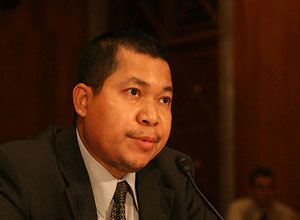Nine human rights organizations are calling on the U.S. to prioritize democracy and human rights in Burma by exercising caution when it comes to the relaxation of sanctions.
 In a letter to President Obama, the groups urged a gradual approach that “enables the U.S. government to engage and influence the Burmese government in a direction that supports genuine and sustained political reform towards democratization, durable peace, and improved respect for human rights.”
In a letter to President Obama, the groups urged a gradual approach that “enables the U.S. government to engage and influence the Burmese government in a direction that supports genuine and sustained political reform towards democratization, durable peace, and improved respect for human rights.”
Aung Din, Executive director and co-founder of the U.S. Campaign for Burma, said, “Daw Aung San Suu Kyi recently stated on a scale from one to ten, Burma’s progress towards democracy is ‘on the way to one.’
“Given the magnitude and depth of the obstacles still ahead, governments around the world, including the United States, are prematurely rushing to reward the regime, before a genuine transition to democracy has taken place,” he said.
“While the international community lauds the ‘positive changes’ taking place in Burma, many have ignored the ‘negative changes’: the escalating atrocities the Burmese Army continues to commit against the Kachin and legalized land confiscation laws. Burma’s changes have been ‘one step forward and two steps back’,” Aung Din said.
The letter comes on the heels of an initiative by corporate interests encouraging President Obama to ease restrictions on private investment across all sectors of the Burmese economy.
United to End Genocide President Tom Andrews said, “The issue of rolling back sanctions on Burma could be a matter of life and death for tens of thousands now under siege by the Burmese military. Any changes should be linked to specific action by the Burmese government, starting with an end to the ongoing human rights violations.”
Andrews recently returned from a trip to Burma’s Kachin State where he said 75,000 Kachin have been displaced by Burmese army attacks. The organization also just released a report, “Not Open for Business”, warning investors that risks remain high.
Aung Din and Andrews testified before the U.S. House subcommittee on Asia and the Pacific on Wednesday.
In his testimony, Augn Din said amending the Burmese Constitution and internal peace must be a central concern for international governments.
“Amending the undemocratic 2008 Constitution is the single most important issue,” he said. “This constitution grants supreme power to the military’s commander-in-chief, who can run the military as he deems fit. The military is independent from all administrative, legislative and judiciary authority; yet can also interfere in all branches of the government.
“It holds 25 per cent of the seats in each parliament and three significant security ministries in the government, and ensures civilian judges have no jurisdiction over armed forces.”
If Burma hopes to move toward a genuine democratic government, civilian oversight of the military and removal of the military’s authority over the government are imperative, he said.
Regarding peace talks with ethnic groups, he said: “Current peace talks between ethnic armed groups and the regime will not lead to the permanent ending of civil war, without granting ethnic rights, such as a certain degree of autonomy, self-determination, proper sharing of revenue generated from natural resources located in ethnic areas which represents 60 per cent of the country’s total area, as well as a complete end to human rights violations in ethnic areas committed by the Burmese military.
“Even now, severe fighting between the Burmese army and ethnic armed groups are going on in Shan and Kachin States having forced hundreds of thousands of ethnic people to flee from their homes and villages,” he told U.S. lawmakers.
The United States Campaign for Burma (USCB) is a U.S.- based organization dedicated to empowering grassroots activists around the world to rally for human rights and to bring an end to the military dictatorship in Burma. Since it's founding in 2003, USCB’s has included celebrities, musicians, global leaders, policymakers, and 70,000-plus grassroots members across the U.S.



